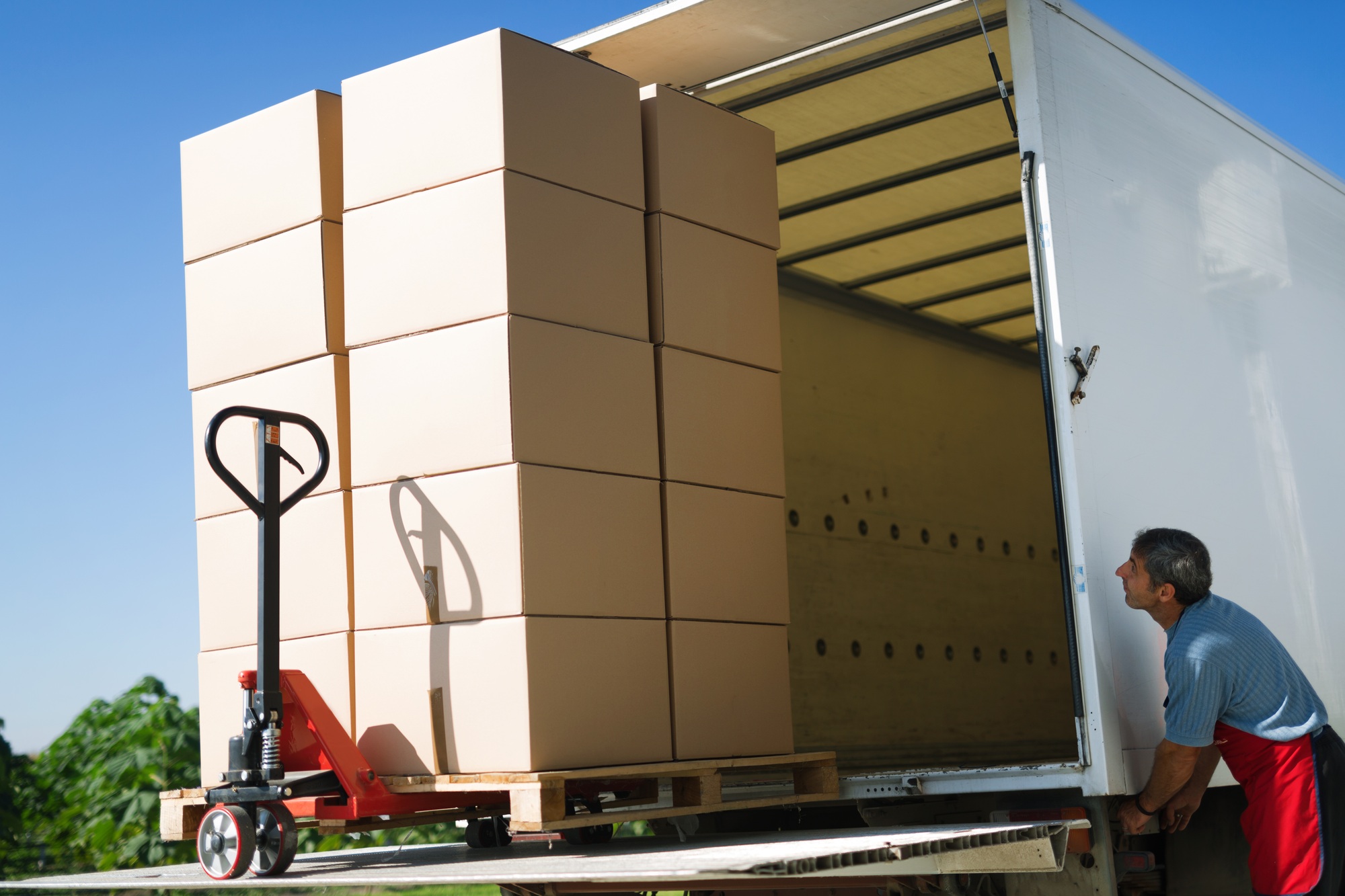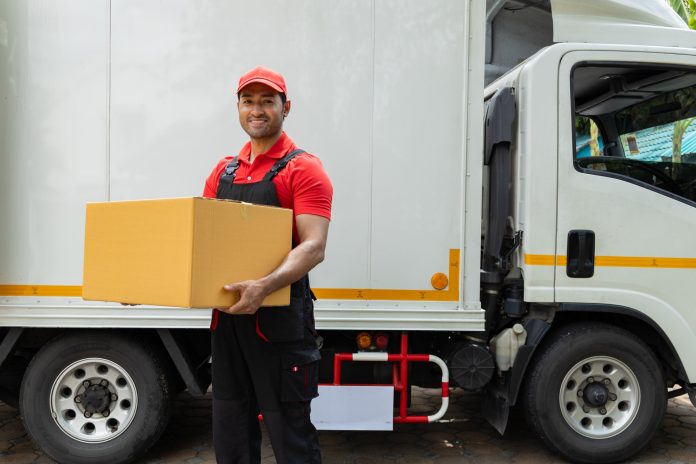Ready to launch your own box truck business?
This exciting venture lets you be your own boss while earning income. Imagine yourself as the critical link between goods and their destinations, delivering for local businesses or managing last-mile logistics for major companies.

This guide will steer you through the critical steps to establish your box truck business. From registering your enterprise to obtaining the right insurance, we’ll empower you with the knowledge needed to excel in the box truck industry. Let’s begin on this journey to success together!
Key Takeaways
- Establish your business legally by registering an LLC, securing an EIN, and obtaining necessary permits like MC and USDOT numbers. This is your business’s foundation—without it, everything else may collapse.
- Open a dedicated business checking account and secure box truck insurance to protect your assets. Think of this as your financial armor, shielding your investments from unforeseen challenges.
- Develop a complete business plan that includes market research, pricing strategies, and a focused marketing approach. This plan acts as your navigation system; without it, you risk losing your way in a crowded marketplace.
- Invest in necessary equipment and cultivate relationships with potential clients to ignite your revenue stream. Like nurturing seeds in a garden, these connections will flourish and yield rewards over time.
Developing a Comprehensive Business Plan
Creating a complete business plan is like crafting a treasure map for your box truck business. It navigates the twists and turns of the transportation and logistics industry, steering you clear of pitfalls and guiding you toward your goals. So, what should this plan include?
Start with market research. Who needs your box truck delivery services? Think local businesses, e-commerce platforms, or individuals relocating. Understanding your customers allows you to tailor your services to their specific needs.
Next, define your operational strategy. Will you own your box truck outright or use commercial truck rental services? Each choice has its pros and cons, much like deciding between renting or buying a video game. Renting saves money upfront, while ownership can lead to long-term savings.
Your financial projections are critical. Estimate your earnings and outline your costs, including commercial auto insurance, fuel, and maintenance. Think of this as budgeting for a big project—without a solid plan, you risk running out of resources!
Address legal requirements. Securing a business license and possibly a commercial driver’s license (CDL) is necessary. It’s like getting the right permission slip signed before a field trip—necessary for a smooth journey.
To attract customers, develop a marketing strategy. How will you promote your box truck company? Consider social media, local ads, or load boards to find work. Your marketing strategy is your way of saying, “Hey, look at me!” to potential clients.
At last, contemplate your growth strategy. As your box truck business grows, you may want to expand your fleet or services. This is akin to leveling up in a video game—each level presents new challenges and rewards.
A well-crafted business plan is your roadmap to success in the box truck industry. It keeps you organized, focused, and prepared for whatever comes your way. Are you ready to start drawing your treasure map?
Understanding Startup Costs and Financial Projections

Starting a box truck business is like planting a seed; with the right care and planning, it can grow into a thriving venture. But before diving in, it’s critical to understand your startup costs and create accurate financial projections. Why is this significant?
Since knowing your initial financial needs helps you avoid costly missteps later on.
Let’s break down the key startup costs. Think of these as the bedrock of your business:
- Truck Purchase or Rental: A new box truck may cost between $20,000 and $50,000. While renting seems cheaper, those monthly fees can add up to about $2,500.
- Insurance: You’ll need commercial auto insurance, averaging around $1,200 monthly. This acts as your safety net against unforeseen events.
- Licenses and Permits: Don’t forget to budget for your business license and any necessary permits.
- Equipment: Invest in material handling tools like pallet jacks and load securing devices, which can cost a few hundred dollars.
Now, let’s explore financial projections. This is your roadmap for forecasting income and expenses—like gazing into a crystal ball to see your business’s future. Here are necessary elements for consideration:
- Monthly Expenses: Expect around $15,500 for fuel, maintenance, and insurance.
- Revenue Streams: Depending on your routes, you could earn between $12,000 and $20,000 monthly. Local deliveries might yield less than long-haul trips.
- Cash Flow Management: Maintaining steady cash flow is critical. Think of it as testing your gas tank full to avoid running on empty.
Launching a box truck business requires careful planning and a firm understanding of your startup costs and financial projections. Just as a ship needs a captain to steer through storms, your financial savvy will steer your business toward success.
| Cost Item | Estimated Cost |
|---|---|
| Truck Purchase | $20,000 – $50,000 |
| Monthly Insurance | $1,200 |
| Licenses & Permits | Varies |
| Equipment | Several hundred dollars |
Navigating Permits and Licenses for Box Truck Operations
Launching your own box truck business is exhilarating, much like hitting the open road in a shiny new vehicle. But before you speed ahead, you must steer the complex place of permits and licenses that keep your operations legal and efficient. Think of it as gathering critical tools before building a treehouse; without them, your plans could come crashing down.
Initial, you need a commercial driver’s license (CDL). If your box truck weighs over 26,000 pounds, a CDL is necessary. It’s your gateway into the box truck world; without it, you’re stuck at the starting line.
Next, secure your business licenses. Registering with local and state authorities is like getting a library card; it grants you the right to operate and ensures you follow the rules. If you plan to transport goods across state lines, obtaining operating authority is critical—your pass to travel beyond local borders.
Insurance is another non-negotiable element. You’ll need commercial auto insurance to protect your box truck and its cargo. Driving without insurance is like walking a tightrope without a safety net—one misstep could lead to catastrophe.
Here’s a quick checklist of necessary requirements:
- Commercial Driver’s License: Mandatory for larger box trucks.
- Business License: Register with local/state authorities.
- Operating Authority: Required for interstate transport.
- Commercial Auto Insurance: Safeguards your truck and cargo.
You might wonder, how do you keep track of these requirements?
Just as a pilot reviews their flight plan before takeoff, maintain a driver qualification file to make sure compliance with DOT regulations. This file is your roadmap through the complicated trucking industry.
At last, don’t overlook local permits. These vary by location and function like local traffic rules, ensuring smooth operations. Research these requirements to avoid unexpected bumps in the road.
Acquiring the Right Box Truck and Equipment

Ready to launch your box truck business? Acquiring the right box truck and equipment is critical. Think of your truck as the heartbeat of your operation; without it, your logistics venture can’t flourish. So, how do you select the perfect one?
Start with cargo capacity. Like a carefully packed suitcase, your truck should accommodate all your cargo without spilling over.
Next, weigh the options: buy or lease?
Purchasing a truck is like planting a tree—an investment that yields long-term benefits. Leasing, conversely, is akin to renting an apartment; it offers flexibility but can become costly over time. New box trucks usually range from $25,000 to $90,000, while leasing requires a smaller upfront payment but may result in higher in general expenses.
Don’t forget commercial auto insurance. This is your safety net against unforeseen costs. Just as you wouldn’t ride a bike without a helmet, operating a box truck without insurance is a gamble. Research different providers to find a plan tailored to your needs.
Consider the material handling equipment necessary for efficient loading and unloading. Tools like pallet jacks and load securing gear are indispensable. If your truck is the heart, this equipment serves as the muscles, ensuring smooth operations.
Wondering how to find work?
Start by connecting with freight brokers or utilizing load boards. These platforms link you with businesses in need of transportation services, much like a matchmaking site for box truck owners. Don’t overlook local delivery services, especially with the growing demand for last-mile delivery.
At last, maintain a steady cash flow. Your business will face different expenses, from insurance to fuel. Testing personal and business finances separate is critical—like having distinct backpacks for school and sports. Each serves a purpose, and mixing them can lead to confusion.
Acquiring the right box truck and equipment demands thoughtful planning and research. By honing in on your specific needs, understanding your financial options, and ensuring you have the right tools, you can set the stage for success in the box truck industry. For detailed steps on starting your box truck business, check out this helpful guide.
Establishing Insurance Requirements for Your Business
Starting a box truck business? While insurance may not be your initial thought, it’s your safety net on a tightrope. One misstep without it could lead to a fall you can’t recover from. So, what insurance requirements should you consider?
Initial and foremost, you need commercial auto insurance. This isn’t just smart; it’s a legal necessity. Think of it as your protective shield against the unexpected—like running out of gas on a long trip. Usually, you’ll require a minimum of $1,000,000 in liability insurance and $100,000 in cargo insurance. Why?
Since if something goes wrong, you want to be covered—like a knight in shining armor.
Next, consider cargo insurance. This safeguards the goods you transport. Imagine delivering a brand-new TV; if something happens during transit, cargo insurance ensures you won’t be left with the bill. It’s your safety net when things go awry!
Don’t overlook trucking regulations. Depending on your location, you may need additional permits or licenses. This is where business registration comes into play. Registering your business is like getting a ticket to the big game; without it, you can’t play. You’ll also need a business license to operate legally in your area.
How do you find the right insurance?
Start by gathering insurance quotes from different providers. Compare them like different brands of cereal—seek the best value for your needs. Consulting with an insurance agent who specializes in the transportation and logistics industry can also help make sure you don’t miss anything critical.
At last, maintaining a steady cash flow is necessary. Insurance bills arrive like clockwork, so budgeting for these costs is critical. Think of it as setting aside money for a monthly subscription; forget, and you might find yourself in a tight spot.
Establishing insurance requirements for your box truck business isn’t just a checkbox; it’s critical for thriving without unnecessary risks. Stay informed and prepared, just like a seasoned box truck owner-operator ready to hit the road!
Setting Up a Business Bank Account and Financial Management
Starting a box truck business? One of your initial steps should be to set up a business bank account. Why?
Mixing personal and business finances is like sharing a messy room with a sibling—it complicates everything. Testing them separate clarifies your income and expenses, making financial planning straightforward.
To open a business bank account, register your business and obtain a business license. Think of this as getting your driver’s license before hitting the road. You’ll also need your Employer Identification Number (EIN), which the IRS provides upon registration. With these documents ready, visit your chosen bank to start the process.
A business checking account is necessary for your box truck venture. It allows you to:
- Track expenses: Monitor where your money goes—fuel, maintenance, and more—ensuring a steady cash flow.
- Manage income: Know your earnings from deliveries, aiding in accurate financial projections.
- Build business credit: Just as you earn a reputation in your community, a business account helps establish your creditworthiness.
Now, let’s explore financial management. Imagine your box truck as a vehicle needing fuel to run smoothly. Without proper management, it risks running out of gas—figuratively speaking! Keep these tips in mind:
- Keep detailed records: Document every trip, delivery, and expense. It’s like testing score in a game; it shows your progress.
- Budget wisely: Allocate funds for fuel, insurance, and maintenance. Planning for business expenses is as critical as a student budgeting for school supplies.
- Review regularly: Monthly financial check-ins help you spot patterns—if you need more clients or if expenses are too high.
- Budgeting: Create a detailed budget outlining all expected costs. This helps you avoid surprises, much like ensuring your gas tank is full before hitting the road.
- Expense Tracking: Use apps or tools to monitor your spending. It’s like having a GPS that shows where your money is going.
- Vehicle Maintenance: Schedule regular service for your box trucks to prevent costly repairs down the line. Think of it as a health check-up for your fleet.
- Fuel Efficiency: Optimize routes to minimize fuel costs. This is akin to finding shortcuts on a road trip—saving both time and money.
- Routine Checks: Schedule regular inspections to catch problems early. It’s like checking your tire pressure before a long drive.
- Use Quality Parts: Invest in high-quality parts for repairs. Cheaper options may save you money now but can lead to higher costs later.
- Setting competitive prices for your delivery services.
- Building strong relationships with freight brokers for consistent work.
- Expand Your Network: Load boards and freight brokers introduce you to new clients, increasing your chances for repeat business.
- Maintain Steady Cash Flow: Regularly finding loads ensures a stable income, even when bills pile up.
- Optimize Routes: Choosing the right loads enables efficient trip planning, saving both fuel and time.
-
In the transportation and logistics industry, effective financial management is critical for your box truck business growth. By separating personal and business finances, you pave the way for success, allowing you to focus on what you love—delivering goods and being your own boss!
Creating Effective Marketing Strategies for Customer Acquisition
Launching a box truck business demands powerful marketing strategies for customer acquisition. Think of your marketing plan as a treasure map, leading you through the competitive waters of the transportation and logistics industry. So, where do you start?
Begin with complete market research. Who are your potential customers?
Are they local businesses needing delivery services or individuals relocating?
Understanding your target audience is like knowing the place before Begining on a journey. This knowledge enables you to customize your services, making them irresistible.
Next, develop a compelling branding strategy. Your brand should reflect the reliability and professionalism of your box truck company. Imagine it as the flag you hoist on your ship—distinctive and confidence-inspiring. Create a memorable logo, choose a together color palette, and maintain consistency across all platforms.
In today’s digital age, digital marketing is necessary. Harness social media marketing to engage potential customers. Platforms like Facebook and Instagram allow you to showcase your services and connect with your audience. Share testimonials from satisfied clients; these act as virtual word-of-mouth, fostering trust.
Lead generation is critical. Use load boards to find job opportunities or reach out to freight brokers directly. This is akin to casting a wide net to catch as many fish as possible—the more leads you generate, the greater your chances of securing contracts.
Don’t underestimate customer retention. Testing existing customers is often easier and more cost-effective than acquiring new ones. Offer promotions for repeat business or establish loyalty programs. Think of it as nurturing a garden; with care, it will thrive and yield abundant rewards over time.
At last, keep a close eye on your operational costs. Make sure your marketing strategies align with your budget. Just as a captain must wisely manage their ship’s resources, you must maintain steady cash flow to keep your business afloat.
Effective marketing strategies for your box truck business encompass understanding your market, building a strong brand, leveraging digital platforms, generating leads, retaining customers, and managing costs. With these strategies, you can steer the box truck industry and steer your business toward success.
Exploring Route Planning and Logistics Management
Starting a box truck business is like assembling a puzzle; each piece—route planning and logistics management—must fit perfectly for success. How do you make sure every piece aligns?
Let’s look at route planning. Picture it as crafting a treasure map. Your mission?
Uncover the most efficient routes for delivering goods while saving time and fuel. Tools like electronic logging devices can streamline your paths, helping you avoid traffic snarls. Wouldn’t you rather reach your destination quickly and effortlessly?
Next, think about logistics management. Imagine being the conductor of an orchestra, where every musician plays a critical role. In the transportation and logistics industry, you manage everything from vehicle maintenance to customer service. Testing your box truck in top shape is critical. Regular tire and engine checks prevent breakdowns, just as a conductor ensures each musician is ready to perform.
As your box truck business grows, maintaining a steady cash flow becomes necessary—it’s your lifeblood. How can you keep it flowing?
Open a business checking account to separate your personal finances. This simplifies tracking expenses and managing insurance bills and other costs.
Attracting customers is similarly critical! Use load boards to find jobs or connect directly with freight brokers. It’s like casting a wide net to catch as many fish as possible; the more connections you make, the greater your opportunities for delivery services.
At last, compliance is non-negotiable. You’ll need a commercial driver’s license (CDL) and must follow different regulations, including hours of service regulations. This is your roadmap to operating legally and efficiently. Are you ready to steer this exciting journey?
| Aspect | Importance |
|---|---|
| Route Planning | Optimizes delivery efficiency |
| Logistics Management | Ensures smooth operations |
| Steady Cash Flow | Sustains business growth |
| Compliance | Avoids legal issues |
By mastering these elements, you’re not just launching a box truck business; you’re building a solid foundation for success. Are you ready to take the wheel?
Managing Operational Expenses and Maintenance Costs

Managing operational expenses and maintenance costs is like steering a ship through stormy seas. How do you keep your box truck business on course and profitable?
Let’s jump in.
Consider your operational expenses as the fuel that drives your journey. This includes commercial auto insurance, fuel, and box truck driver salaries. Mismanagement can leave your business stranded—figuratively speaking!
Focus on these critical areas:
Now, let’s tackle maintenance costs. These expenses make sure your trucks remain in top shape. Just as a gardener tends to their plants, you must nurture your vehicles. Consistent maintenance prevents bigger issues, in the end saving you money.
Do these strategies:
Maintaining a steady cash flow is critical. Make sure your income surpasses your expenses by:
-
By effectively managing your operational expenses and maintenance costs, you can steer your box truck business toward success. Remember, every dollar saved brings you closer to your goals!
Understanding Local Regulations and Compliance Needs
Starting a box truck business is like Begining on an adventurous voyage; understanding local regulations and compliance needs serves as your guiding compass. Without it, you risk veering off course. So, what essentials do you need to steer these waters?
Initial, tackle business registration. Think of this as naming your ship in the busy sea of commerce. Register your business with local and state authorities, as each state has distinct licensing requirements. Check with your local government to secure the necessary permits.
Next, consider the commercial driver’s license (CDL). Not every box truck driver requires one, but if your truck’s gross vehicle weight rating exceeds 26,000 pounds, a CDL is critical. It’s like possessing a special key to enter exclusive ports; without it, your journey is stalled.
Then, focus on insurance requirements. Just as a sailor needs a life jacket, you must have commercial auto insurance to protect your business. This coverage safeguards against damages to your truck and your cargo. Shop around to find a policy that fits your needs.
Plus, familiarize yourself with zoning laws in your area. These regulations dictate where you can operate and park your truck. Picture them as traffic signs on your journey; they guide you on where to go and where to halt.
Maintaining vehicle registration is also critical. Just like renewing your driver’s license, your box truck must be registered and compliant with state regulations. This ensures your vehicle remains safe and roadworthy, allowing for smooth transportation of goods.
At last, keep your financial projections in focus. Just as a captain charts their course, you must carefully plan your expenses and income. This includes understanding your startup costs, like purchasing or leasing a box truck, along with ongoing expenses such as fuel and maintenance.
Grasping local regulations and compliance needs is not just a formality; it’s the bedrock of a thriving box truck business. By securing the necessary licenses, insurance, and registrations, you can focus on what truly matters—growing your business and delighting your customers.
Leveraging Load Boards and Freight Brokers for Business Growth

Starting a box truck business opens doors in the booming transportation and logistics industry. To accelerate your growth, mastering load boards and freight brokers is critical. But how do these tools function, and why are they critical for your success?
Think of load boards as digital marketplaces—like a virtual bulletin board—where box truck drivers can find available jobs. These platforms showcase loads that need transportation, allowing you to choose options that align with your schedule and skills. It’s like browsing a menu at your favorite restaurant; you pick what excites you from the offerings!
Freight brokers act as matchmakers between shippers and carriers, connecting businesses with dependable transportation services. By collaborating with freight brokers, you tap into a network of clients excited to move their goods. Picture them as a well-connected friend who can introduce you to potential customers.
Utilizing these resources can help you:
Yet, many truck drivers fail to fully use these tools. To thrive, you must steer these platforms adeptly and cultivate strong relationships with brokers. Keep your business registration and operating authority organized—much like testing your schoolwork in order!
As your box truck business grows, consider investing in material handling equipment to increase efficiency. Tools like dollies or straps are necessary for securing loads. Just as a chef requires the right utensils to craft a meal, you need the proper equipment to deliver goods safely.
Leveraging load boards and freight brokers is a strategic move for your box truck business. They help you find work, expand your network, and make sure a reliable cash flow. So, are you ready to begin on your box truck journey?
Building a Strong Network within the Transportation Industry
Building a strong network within the transportation industry is like tending to a flourishing garden; the more connections you cultivate, the more your business thrives. Have you thought about how necessary relationships are for launching your box truck business? This is your chance to connect with individuals who can drive your growth.
Networking is critical for a successful box truck delivery business. Forge relationships with freight brokers, the matchmakers of logistics, who can provide loads and help you find customers. Don’t wait for opportunities to come to you; actively reach out to these key players. Use load boards to find available jobs or contact freight brokers directly to build strong partnerships.
Attending local networking events or trade shows can be transformative. Think of these gatherings as treasure chests filled with potential partnerships. Here, you can meet fellow box truck owners, exchange experiences, and share insights. These connections often lead to repeat business and new opportunities. Ever wondered why some businesses seem to thrive effortlessly?
They’ve invested time in building a strong network.
Don’t underestimate the power of social media! Platforms like LinkedIn are excellent for connecting with industry professionals. Join groups focused on the transportation and logistics industry and engage in discussions that could spark valuable partnerships. Remember, box truck companies flourish on referrals and strong relationships. As your network expands, so does your potential customer base.
To maintain a steady cash flow, diversify your network. Include contacts such as box truck owner-operators, local businesses needing delivery services, and suppliers of material handling equipment. Each connection offers valuable insights and opportunities that can set your business apart.
As you begin on your journey to start a box truck business, recognize that networking is a powerful tool. By nurturing relationships with key industry players, you improve your chances of success and create a supportive community around your business. Are you ready to plant those seeds?
Summing up
Starting a box truck business is more than a venture; it’s an exciting journey brimming with possibilities. Picture yourself building necessary connections in the dynamic transportation sector. Careful planning serves as your guiding compass—obtain the necessary permits and keep your finances to steer your business smoothly. A strong network functions like a bridge, linking you to potential customers and driving your growth. With grit and dedication, you can feel the exhilarating freedom of entrepreneurship. Why hesitate?
Seize the moment and kick off your adventure in the box truck industry today!
Frequently Asked Questions
What are the common challenges faced when launching a box truck business?
en: Common challenges include securing financing, finding your way regulations, finding reliable customers, and managing operational costs.
What is the initial step to starting a box truck business?
en: The initial step is to register your business, ideally as an LLC, to protect your personal assets and establish a solid foundation.
What is the biggest box truck without a CDL?
The biggest box truck you can operate without a CDL is usually a 26-foot truck, as long as it weighs under 26,001 lbs.
How do I find clients for my box truck services?
Network with local businesses, join online platforms, and use social media to showcase your services and attract clients.



